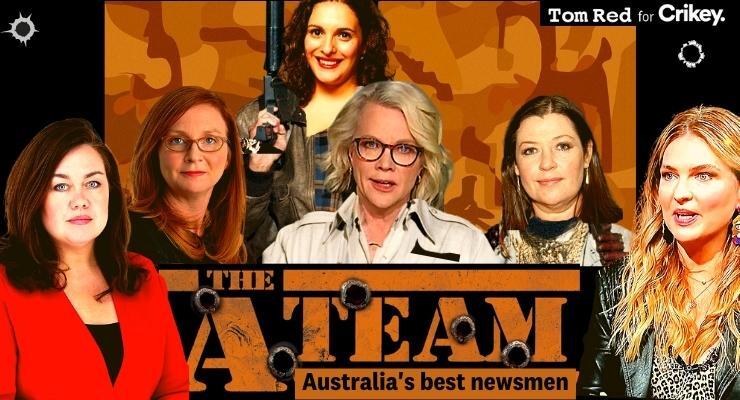
It’s been a big year for news — but what about for the news media? Hopefully, we’ve learnt a bit. Here are four big takeaways (and a couple of small pointers):
Journalism can make a difference
A weakened journalism struggles with impact: it’s proving too hard to embarrass Australia’s political elite enough to force any shift in behaviour. But this year came the big exception with journalist- and whistleblower-driven reporting on abuse, harassment and mistreatment of women in Parliament House.
This time last year there was a quiet ruminatin’ going on about the first Four Corners stab Inside the Canberra Bubble, with more than a little relief from certain quarters that they’d dodged a bullet and a bit of wonderin’ if there was another shoe to fall.
Turned out to be a cobbler’s storeroom full, and here we are a year later with criminal charges, a couple of ministers’ scalps, multiple reports for action, and a slow-burn “women’s problem” for the conservative parties spilling into “Voices of” independents challenging their heartland seats.
It was a story that demonstrated, too, the changing of the guard in Australian journalism with the gallery A-team emerging from the pack to push the story along.
Journalism can change what we see
Crikey gave Australian journalism its “emperor has no clothes” moment in May with its dossier of lies and falsehoods. How Australia’s media responded tells us how we can expect big shifts like this to percolate through an increasingly heterodox news media.
In digital- and youth-oriented media from Junkee to Guardian Australia (and on Twitter), the analysis went viral and ended up as accepted wisdom. In traditional centrist media like the ABC and the Nine mastheads, it meshed with the vaccine strollout to trigger a more critical reporting of the government — although they ducked the “L” word, using it only in cautious “they said” attributions to others.
And in right-wing voices like the News Corp media? It turned out to be something best ignored. Although it wasn’t easy when by year’s end even passers-by interrupted prime ministerial press conferences with shouts of “Liar!”
Meanwhile, on commercial television news, it was as though 2021 never happened, the year ending with the standard visuals of Morrison: hi-vis jackets, big trucks with honking horns, the prime minister playing with balls.
Sometimes is doesn’t make much difference at all
COVID has demonstrated a big truth: “news” has slipped the collar of journalism. Now premiers present the news that matters. Two years into the pandemic and there’s not much sign that Australia’s media have learnt from the experience.
It wasn’t for want of opportunity. The pandemic — and the public health response — demonstrated a growing inequality as the rich got (a lot) richer and the locked-down suburbs got fined for breaching curfew. It exposed both the enduring strengths of government and the extent they’ve been hollowed out by decades of neoliberalism. If you can’t find plenty of stories in all of that, you’re not looking.
Yet in Australia’s media, COVID was crowded beaches and playgrounds, where too many people doing the wrong thing just needed a better dose of good old iron-hand policing.
Global heating is too hard — still
Our changing climate is the story of our age — everywhere except in the news media. This year — as it has for the past 15 years — it plays out as all politics all the time.
It’s asymmetry in both-sides reporting at its worst. One barrier too low: can Morrison do nothing while pretending to do something? The other too high: can Anthony Albanese do something while pretending to do nothing?
It’s what happens when your news cycle is dictated out of Canberra by what important people say or do, whether by choice or circumstance. Put Morrison face to face with the need for a pretence of action around the Glasgow COP summit and, briefly, climate change will get a run around the cycle.
Meanwhile, the real climate news makes, at best, fleeting guest appearances before being drowned out: news like the Intergovernmental Panel on Climate Change confirming what was heavily contested just two years ago — that Australia’s summer of bushfires was the result of a heating planet.
Maybe that will change reporting of future fires — but, me, I’d back an arson reprise next time around.
And two not-so-big….
Alan Jones suggests Australia’s media right could be fragmenting from the Murdochs, just like in the United States.
And Australia’s “Independent. Always” Nine mastheads that resisted front page ads for decades show they’re happy to go all political — as long as you pay them enough.








Well-funded national broadcasters (ABC, SBS) would be a promising kick-start to less lazy & more investigative journalism. Anathema to Morrison & Co.
Where are we at with the news cycle? 1 week, 24 hours, 15 minutes?
Where are we at with career/job security for journalists?
Where are we at with news room budgets?
How many Journalists have been made redundant in the last 10 years?
when was the last time a masthead was taken over by a female led management team?
how many news outlets are owned by women?
what would the CWA do?
Come on Billy, my guess is there are plenty of active female journalists out there. Just watch the news bulletins and Inciters on Sunday.
Owners and bosses, fewer I am sure but owners don’t dictate policy, do they, Rupert?
Great image Tom Red. Thanks.
Michael West just reported on being excluded from joining the Canberra bubble, that is being excluded from membership in the press gallery. Where is Crikey on that?
They once railed against it, being locked out of the Budget lock-up but now they are part of the comfy mutual masturbatory mob.